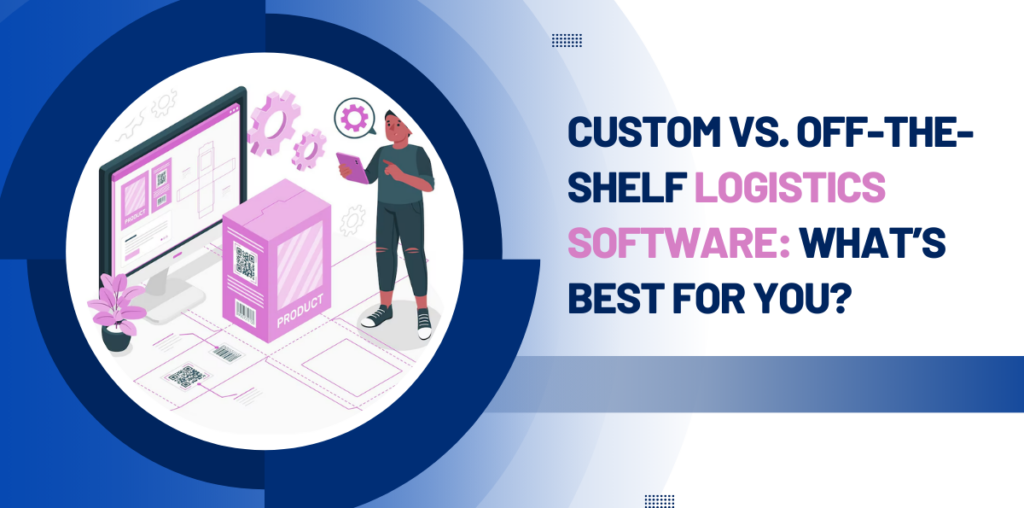The logistics industry plays a crucial role in the global economy, facilitating the movement of goods and services across regions. Over the years, logistics companies have turned to software solutions to optimize their operations, improve efficiency, and reduce costs. However, when it comes to choosing the right logistics software, companies face two primary options: custom logistics software or off-the-shelf logistics software.
Both options come with their own sets of benefits and challenges. In this article, we will explore the differences between custom and off-the-shelf logistics software, weighing the pros and cons of each. By the end of this guide, you’ll have a clearer understanding of which option is best for your specific needs, as well as insights into the role of a Logistics Software Development Company in this decision-making process.
What is Logistics Software?
Before diving into the debate between custom and off-the-shelf logistics software, it’s important to understand what logistics software is and what it does. Logistics software is designed to manage the flow of goods, data, and services across a supply chain. It helps logistics companies and their customers track inventory, optimize routes, manage shipments, and improve overall supply chain visibility.
Key Functions of Logistics Software
Logistics software is essential for managing the complex operations involved in supply chain and logistics management. Here’s a detailed breakdown of the key functions that logistics software typically performs:
- Inventory Management
Inventory management is a core function of logistics software, ensuring that businesses can track stock levels, manage reordering processes, and avoid overstocking or stockouts. It enables real-time visibility into inventory across different locations, including warehouses and distribution centers. This functionality helps businesses optimize their stock, reduce excess inventory, and improve cash flow. It can also automate stock replenishment, providing insights into sales trends to predict future inventory needs.
- Warehouse Management
Warehouse management is another critical function that helps optimize the storage, movement, and handling of goods within a warehouse. Logistics software provides real-time data on inventory levels, location, and movement of goods within the warehouse, enabling businesses to improve efficiency and reduce human error. This function often includes features like barcode scanning, automated picking and packing, and real-time updates on stock levels. By optimizing warehouse operations, businesses can reduce operational costs, improve order fulfillment times, and minimize stock discrepancies.
- Route Optimization
Route optimization helps businesses plan the most efficient delivery routes, minimizing travel time and fuel consumption. Logistics software analyzes variables such as traffic, delivery locations, and vehicle capacity to suggest the best routes. This results in cost savings by reducing fuel expenses, delivery times, and carbon emissions. It also enhances customer satisfaction by ensuring that products are delivered on time. Many logistics software solutions offer dynamic route optimization, adjusting in real time based on factors such as weather conditions or last-minute delivery requests.
- Shipping and Tracking
Shipping and tracking functions within logistics software provide real-time visibility into shipments as they move through the supply chain. This includes tracking parcels, monitoring delivery status, and receiving notifications when goods are shipped or delivered. Tracking information is usually made available to customers as well, improving transparency and customer satisfaction. With integrated shipping features, logistics software can automatically generate shipping labels, manage multiple carriers, and ensure accurate shipping cost calculations, further reducing errors and improving operational efficiency.
- Order Management
Order management enables the seamless processing of customer orders from initial order placement to final delivery. Logistics software tracks each stage of the order lifecycle, including order entry, inventory allocation, packaging, and shipment. This function also helps businesses track backorders, manage returns, and monitor order statuses in real time. Effective order management ensures that products are delivered on time, reduces errors, and improves overall customer satisfaction. By automating many aspects of order processing, businesses can handle larger volumes of orders with fewer resources.
- Freight Management
Freight management involves the coordination of the movement of goods between different points in the supply chain, such as from manufacturer to warehouse or from warehouse to customer. Logistics software helps businesses manage and optimize freight costs, track shipments, and ensure timely delivery of goods. It often includes features for managing multiple carriers, optimizing freight routes, and calculating shipping rates based on weight, volume, or distance. By using freight management functionalities, businesses can improve cost efficiency, minimize delays, and ensure goods are delivered in the most cost-effective manner.
Off-the-Shelf Logistics Software
Off-the-shelf logistics software refers to ready-made solutions developed for a wide audience. These software packages are typically designed to meet the needs of various companies within the logistics industry. They come with standard features that can be used right away, without requiring any customization.
Pros of Off-the-Shelf Logistics Software
- Lower Initial Cost: Off-the-shelf software is usually more affordable than custom solutions. Since it is mass-produced, the cost is spread across multiple customers, making it accessible for small to medium-sized businesses.
- Quick Deployment: With off-the-shelf software, the setup time is significantly shorter. Companies can start using the software almost immediately, reducing downtime and the need for extensive training.
- Proven Track Record: Many off-the-shelf logistics software solutions have been tested and used by numerous companies in the logistics space. This means they are generally reliable and come with customer support options to assist with any issues.
- Regular Updates and Support: Off-the-shelf software providers often offer regular updates and customer support as part of the package, ensuring that the software remains up-to-date with industry standards and regulations.
Example: A popular off-the-shelf logistics software solution is SAP Integrated Business Planning (IBP). This software offers a variety of logistics management tools, including demand forecasting, supply chain visibility, and inventory management, and is used by numerous companies around the world.
Cons of Off-the-Shelf Logistics Software
- Limited Customization: While these software solutions are designed to be flexible, they cannot fully accommodate every unique business need. Companies may need to adjust their processes to fit the limitations of the software.
- One-Size-Fits-All Approach: Since the software is developed for a broad audience, it may include features that are irrelevant or unnecessary for a particular business. This can lead to inefficiency and unnecessary complexity.
- Scalability Issues: As your business grows, off-the-shelf software may not be able to scale to meet your needs. You may find that it becomes inadequate as your logistics operations become more complex.
- Integration Challenges: Off-the-shelf software might not integrate well with your existing systems, such as ERP or CRM software, leading to data silos and inefficiencies.
Custom Logistics Software
Custom logistics software, on the other hand, is tailored specifically to the needs and requirements of your business. This software is developed by a Logistics Software Development Company to address your unique logistics processes, challenges, and objectives.
Pros of Custom Logistics Software
- Fully Tailored to Your Needs: Custom logistics software is built to meet the exact requirements of your business. Whether you need specific features for inventory tracking, warehouse management, or route optimization, custom software can be developed to suit those needs.
- Scalability: As your business grows, custom logistics software can be adapted and expanded to meet your evolving needs. It can be designed to handle larger volumes of data, more complex workflows, and increased user loads.
- Competitive Advantage: Having a custom-built logistics solution can give you an edge over competitors. You can implement innovative features that improve operational efficiency, customer satisfaction, and cost management, all of which can enhance your market position.
- Seamless Integration: Custom software can be integrated with your existing systems, such as accounting, order management, or CRM platforms. This ensures a smooth flow of information and minimizes the risk of errors or data silos.
- Ownership and Control: With custom software, you have complete ownership of the product. You can control how it evolves, ensuring that it always aligns with your business needs and industry trends.
Example: A company that specializes in international freight management might develop custom logistics software that integrates with real-time customs data, automates documentation processes, and optimizes routes based on geopolitical factors. Such a tailored approach would help the company reduce shipping delays and improve delivery accuracy.
Cons of Custom Logistics Software
- Higher Initial Costs: Developing custom software is typically more expensive than purchasing off-the-shelf software. The development process involves designing, coding, testing, and deploying the software, all of which require significant time and resources.
- Longer Development Time: Custom software development can take months, or even years, depending on the complexity of the project. During this time, your business may face disruptions and challenges as you wait for the final product.
- Ongoing Maintenance: Custom software requires ongoing maintenance, updates, and support. You may need to hire a dedicated team or partner with a Logistics Software Development Company to ensure the software continues to perform optimally.
- Risk of Misalignment: If the development process is not carefully managed, there’s a risk that the final product may not fully align with your business needs or expectations. This can result in wasted resources and frustration.
Key Factors to Consider When Choosing Between Custom and Off-the-Shelf Logistics Software
1. Budget and Resources
Your company’s budget plays a significant role in determining which option is best for you. If you have a limited budget or need a quick solution, off-the-shelf software may be the more cost-effective option. However, if you can allocate a larger budget for long-term growth and scalability, investing in custom software could be a worthwhile choice.
2. Business Requirements and Complexity
If your logistics operations are relatively straightforward, off-the-shelf software may suffice. However, if your business involves complex logistics workflows, specific integrations, or unique customer requirements, custom software would provide the flexibility needed to meet these demands.
3. Time Constraints
Off-the-shelf logistics software can be deployed quickly, while custom software requires time to develop, test, and implement. If time is a critical factor, opting for off-the-shelf software might be the better choice.
4. Future Growth
Consider your company’s future growth and whether the software can scale with you. If you anticipate rapid growth or changes in your logistics processes, custom software offers more flexibility to adapt to new challenges.
5. Support and Maintenance
Off-the-shelf software often comes with support and regular updates, while custom software requires ongoing maintenance and support from a dedicated team. Consider the long-term commitment required for custom solutions and ensure you have the necessary resources for maintenance.
Conclusion
Both custom and off-the-shelf logistics software have their advantages and drawbacks. Off-the-shelf logistics software is ideal for businesses with simpler requirements, a limited budget, and the need for quick deployment. It’s a cost-effective solution, but it comes with limitations in terms of customization and scalability.
On the other hand, custom logistics software provides a tailored solution that aligns with your unique business needs. It offers greater flexibility, scalability, and the potential for competitive advantage. However, it requires a larger initial investment, longer development time, and ongoing maintenance.
By carefully assessing your business needs, budget, and long-term goals, you can make an informed decision. If you choose the custom route, partnering with a reliable Logistics Software Development Company will be key to ensuring the success of your project and driving the future growth of your logistics operations.



